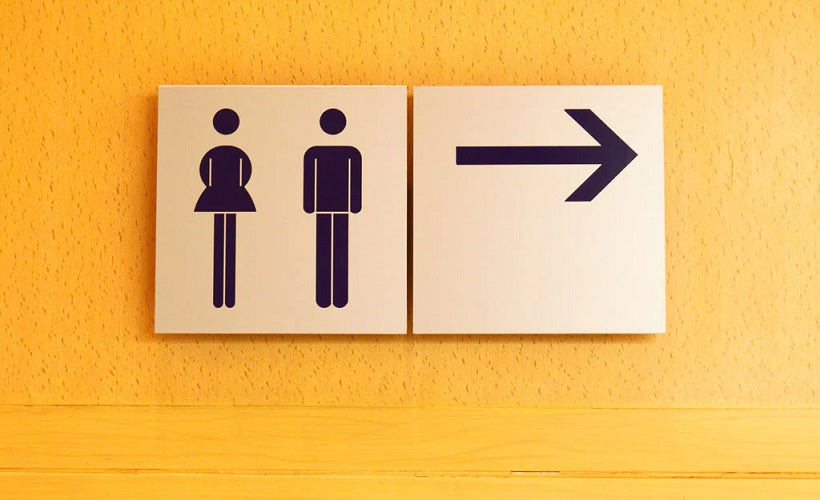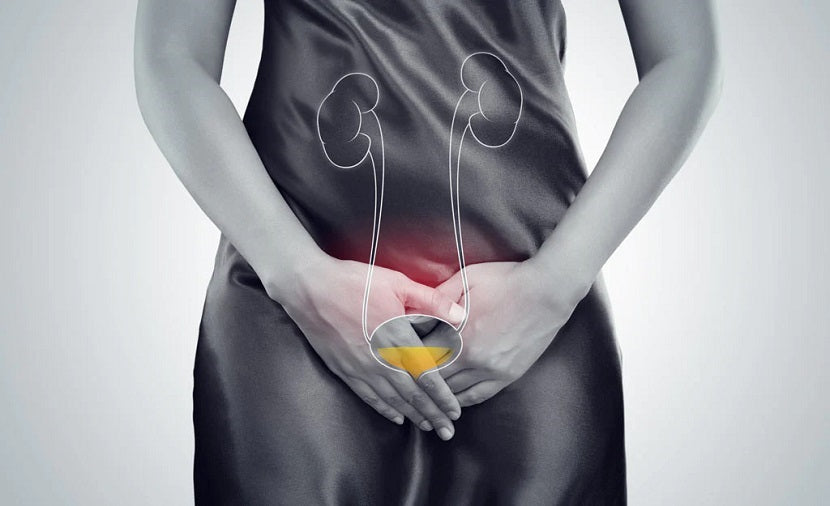Ever find yourself desperate for the loo, even though you’ve just been? Do you feel as though you are constantly rushing to the toilet all day long? Or waking up in the night? Does it feel as though it is interfering with your everyday life?
Many women (and men) experience an overactive bladder. It is a common condition that is defined as the frequent and/or urgent need to urinate.
Sometimes when we have an overactive bladder it can be difficult to control. It can be a struggle to reach the loo in time, resulting in urinary incontinence. This is the involuntary loss of urine control.
Having an overactive bladder can be an uncomfortable experience, and it can also make daily tasks more difficult. It can have a significant effect on the quality of life and affects 12-17% of the population. Its prevalence increases with age.
But before knowing what some overactive bladder treatments are, it's important to understand what may be causing it in the first place.
What Causes An Overactive Bladder?
Often, an overactive bladder is caused by ineffective urination. This is where the bladder cannot hold onto the 300ml capacity of urine because it has lost its muscular tonicity.
What are the common triggers of an overactive bladder?
- Stress
- Recurring urinary tract infections (UTIs)
- Dehydration
- Diabetes
- Excess consumption of caffeine or alcohol
- Side effects of medications
- Underlying inflammatory conditions (i.e. acidity)
- Hormonal changes during menopause in women
- Detrusor muscle overactivity
- Weak pelvic floor muscles
The Connection Between the Kidneys and the Urinary System
Another possible cause of an overactive bladder could be attributed to a kidney deficiency. This is when the kidneys stop working as they should do and are no longer able to remove waste and extra water from the blood.
How does this affect the bladder?
The bladder, urinary system and kidneys all have an influencing relationship with each other. In Chinese medicine, an overactive bladder can be attributed to weak kidney energy.
The kidney has many functions, including:
- Regulating blood pressure
- Reducing acidity (metabolic acidosis)
- Disposing of waste material from the blood
- Regulating water and fluid balance
- Producing erythropoietin to build new red blood cells
- Maintaining acid-alkaline balance
Healthy kidneys act as a filter to remove waste and fluids from the circulating blood. They also help keep the proper balance of salts and acids in the body and produce hormones. Yet when the kidneys are not working as they should do, it can result in an increased need to urinate.
Likewise, if your bladder becomes too full and you do not go to the loo for too long, the pressure can cause damage to the kidneys.
To keep your kidneys healthy it is important to exercise and keep active, control your blood sugar, and ensure that you are drinking plenty of fluids.
How To Treat An Overactive Bladder
Having an overactive bladder can have a real impact on our lives. Getting up often in the night can lead to restless sleep and fatigue. Frequent urination in the day can be time-consuming and a weight on your mind. The urge to urinate can also be an uncomfortable experience.

But it is important to remember that there are many things we can do, food we can eat, and exercises we can partake in to strengthen the bladder. Here are our recommended overactive bladder treatments for restoring bladder tone, supporting bladder health, and relieving urinary frequency.
Stay Hydrated
Slowly increase your water intake to the recommended 2 litres per day. This helps strengthen the integrity of the bladder and ensures that the body is eliminating adequate amounts of wastes. Increasing water intake also has a positive effect on bladder tone because metabolic waste can cause irritation which can contribute to an overactive bladder.
Herbal Tea
Herbal tea can help to optimise kidney function and filtration as they help to expel waste from the body. Dandelion Leaf and Green Tea are some good examples.
Reduce Diuretics
Examples include sugar, tea, alcohol, coffee and carbonated drinks. Diuretics place an extra burden on the kidneys’ filtration and cause the body to lose more water.
Reduce Alcohol Consumption
Alcohol can lead to dehydration and place a burden on the kidneys to remove the waste aldehyde from the system.
An Alkaline Diet
An alkaline diet involves eating foods such as fresh vegetables and fruits, lemon juice, water, brown rice, miso soup and vegetable juices. These foods help to cleanse and tone the kidneys and urinary system. Alternatively, an acidic diet includes inflammatory foods like sugar, wheat, dairy, red meat, oranges, alcohol, and preserved or processed food. To improve bladder health it is best to avoid an acidic diet.
Vegetable Juice
Vegetable juices can encourage liver detoxification and kidney filtration. Some great options are freshly juiced beetroot, carrot, celery and ginger or watermelon, pineapple, green apple and mint. Aim for a juice each day.

Replace Table Salt With Sea Salt
Replace sodium (table salt) with sea salt or vegetable salt. Sodium is important for the health of the kidneys, but not in excessive amounts which can result in fluid retention. Sea salt is rich in many minerals without being refined and does not contain aluminium (used in table salt to keep the salt dry).
Vegetable Broth
Vegetable broths are very rich in nutrients that are essential for the health of the kidneys as well. They’re also great for alkalising excess acidity levels to help take the burden off the kidneys’ filtration system. You can make a broth by boiling kidney beans and a mix of vegetables such as onions, celery, carrots, beetroot, spinach, sea salt, wakame (sea vegetables/ seaweed) and drinking a cup of the broth daily. This recipe is also very rich in minerals which again will help to fortify and nourish the kidneys while improving urinary system function.
How To Improve Bladder Health
Alongside dietary changes there are also other important ways to help support healthy bladder control, another form of overactive bladder treatments.
Pelvic Floor Exercises
Practice your pelvic floor (Kegel) exercises daily as these exercises are aimed to strengthen the pelvic floor muscles and, ideally, the bladder. The pelvic floor muscles go around the urethral opening, vagina, and rectum in women. Like all exercises, they require frequent practise to strengthen the muscles and keep them strong.
Address Underlying Causes
Address underlying causes of decreased kidney function and overactive bladder (OAC). These include stress, acidity, dehydration, inflammatory conditions and a history of urinary tract infections.
Explore Side Effects of Medication
Some pharmaceutical medications cause fluid retention and a decrease in kidney and bladder function. Speak to your GP about possible side effects from any medications you may be currently taking.
Try A Natural Supplement (Happy Bladder)
Natural medicines can play a supportive role in managing symptoms due to their effectiveness and safety. Our product Happy Bladder can be taken daily with food as a natural, healthy, easy, and quick way to improve bladder control. Our formula has been clinically researched and found to help support healthy bladder function.
Research has shown that taking Happy Bladder and supporting bladder health can improve quality of life. This includes feeling less frustrated, being able to confidently take part in social activities, and being able to travel with reduced stress. Using natural medicines can be an effective and efficient way to help maintain bladder health. See best results with our dietary and lifestyle changes, too.










Leave a comment
This site is protected by hCaptcha and the hCaptcha Privacy Policy and Terms of Service apply.